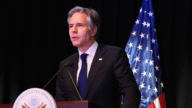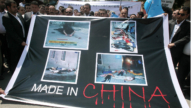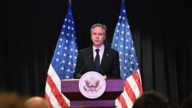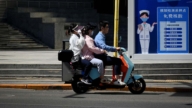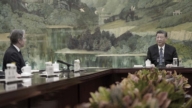【新唐人2014年01月10日讯】30年前,中共国务院总理赵紫阳曾给“香港大学学生会”回信,承诺给香港民主。这封信最近被曝光。那么,当年参与写信的学生,现在香港的中坚力量,他们怎么看待香港的民主现状呢?曾任赵紫阳政治秘书的鲍彤先生,如何分析北京至今不能兑现承诺的原因呢?请看详细报导。
9号,香港《明报》报导,他们在翻阅“香港大学学生会”评议会的历年记录时,发现了1984年1月学生会写给时任中共国务院总理赵紫阳的信,学生会要求香港回归后能够普选特首,而赵紫阳在回信中承诺要“民主治港”。
当年参与写信的1983年“香港大学学生会”外务副会长叶建源,现在是香港立法会的议员。
香港立法会议员叶建源:“当时香港大学的同学在1983年的时候已经开了会,也通过了一些有关香港前途的一些立场。在1983年年底,就决定要写一封信给赵紫阳,表示我们必须实行高度的自治,而高度的自治就应该以民主为基础。”
1984年5月底,赵紫阳回信给“港大学生会”。在信中,他以中共总理身份承诺:“将来香港特别行政区实行民主化的政治制度,即你们所说的‘民主治港’,是理所当然的”。
叶建源至今还记得同学们看到回信后的想法。
叶建源:“他的表述很清楚。他赞成了香港大学学生会的同学在给他的信里头所表达的内容,所以当时我们就感到这个是很好的一个回复。”
在那之后5年,1989年“六四”学生运动中,赵紫阳因同情学生、反对武力镇压,而被迫下台。而香港在1997年回归中国后,针对民主、法治、特首普选等重大问题,民间连年爆发上万人、甚至几十万人的大游行,反对中共当局压制香港的自由、民主。
回首30年来香港的民主之路。叶建源认为,香港的民主还徘徊十字路口,当年的承诺仍未兑现。
叶建源:“因为在过去非常长的一段时间里头,就是说要循序渐进。那这个循序渐进过了30年了,这个已经不能够再用作为借口的。他这个庄严的承诺30年后还不能实现的话,那就太失望了。”
曾任赵紫阳的政治秘书的鲍彤认为,赵紫阳当时是想从上而下的实行政治体制改革,让中国大陆走出一党专制的阴影,但是他失败了。所以直到30年后,中共当局还不能兑现对香港的承诺,就是因为这个体制的原因。
鲍彤:“中国的命运跟香港的命运是在一起的。当中国本身还在毛泽东的一党专制这种体制底下生活的时候,所谓港人治港、所谓一国两制,实际上是不可能实现。香港争取民主的过程,跟中国大陆实现民主的过程应该是一致的,互相支持的。”
在刚刚过去的香港新年大游行中,有大约3万人为“普选特首”、“拒绝中共干预”等走上街头抗议。
叶建源:“现在我们已经有了一个很明确的日期,那就是2017年特首要普选。这个才能对得起30年前赵紫阳用国务院总理的身份来写这封信的。”
有“东方明珠”美誉的香港,在中国清朝期间,因第一次鸦片战争清朝战败,签订《南京条约》,而在1842年割让给英国。1997年7月1号,主权移交回中国,按照中共元老邓小平所谓“一国两制”成为香港特别行政区,实行特首制。
采访编辑/唐音 后制/孙宁
Zhao Ziyang Promised Hong Kong Democracy 30 Years Ago
Thirty years ago, in a letter to the Hong Kong University Students’
Union, the Chinese Communist Premier Zhao Ziyang promised
democracy in Hong Kong.
This letter was recently found.
Those students who wrote to Zhao Ziyang have become the
backbone of Hong Kong.
What is their opinion regarding the democracy of Hong Kong today?
Zhao Ziyang’s Policy Secretary Bao Tong analyses the reasons
why this promise has not been fulfilled.
Please follow us on this report.
In the January 9 report of Hong Kong newspaper, Ming Pao:
a record of Hong Kong University Students’ Union in January
1984 showed a letter addressed to Premier Zhao Ziyang
regarding the election of Hong Kong Chief Executive after
reunification.
In his reply, Zhao Ziyang promised a democratic
administration in Hong Kong.
Member of the Legislative Council of Hong Kong IP Kin-yuen,
then Vice President of the student union, was then one of the
participants drafting the letter to Zhao Ziyang.
IP Kin-yuen, Hong Kong Legislative Council Member:
“In 1983, students at the University of Hong Kong had adopted
a number of resolutions about the future of Hong Kong,
and decided to write a letter to Zhao Ziyang, demanding that
we must exercise a high degree of autonomy on the basis of
democracy."
By the end of May 1984, Zhao Ziyang replied and promised
as the Premier:
“The HKSAR is granted the right to practice a democratic political
system in the future, i.e., the democratic administration."
IP Kin-yuen still remembers how students reacted to
Zhao’s reply.
IP Kin-yuen: “His reply was very clear.
He approved the principles the students had expressed.
We felt encouraged by his letter."
In the five years after that, Zhao Ziyang was forced to step down,
because of his sympathy for the students in 1989 student
movement and his opposition to the military repression.
The principles of democracy, rule of law, and the election of
Chief Executive after Hong Kong’s handover to China in 1997
have urged tens of thousands and even hundreds of thousands of
Hong Kong residents to stage protests opposing the suppression
of the Communist regime every year.
Looking back on the 30 years of Hong Kong’s road to
democracy, IP Kin-yuen believes that Hong Kong is still
hovering at the crossroads and the promises remain unfulfilled.
IP Kin-yuen: “It was said to take a gradual progress.
But, 30 years have passed.
This so called gradual progress excuse is no longer plausible.
It is disappointing that this solemn promise is still yet to be
realized 30 years later."
Zhao’s former political secretary Bao Tong believes that:
Zhao Ziyang was trying to implement political reform from
the top down to get China out of the one-party dictatorship,
but he failed.
It is the dictatorship that failed to honor their commitments to
Hong Kong in the past 30 years.
Bao Tong: “Hong Kong’s destiny is tied to the destiny of China.
With Mao Zedong’s one-party dictatorship,the so-called
“Hong Kong people administering Hong Kong" and
the so-called “one country, two systems" are practically impossible.
Hong Kong and China would share the same path in the process
to democracy and be supportive of each other."
In this past New Year Parade in Hong Kong, there were about
30,000 people that took to the street and called for a Chief Executive
by universal suffrage and opposed the regime’s intervention.
IP Kin-yuen: “Now we’ve set the date, that is,
a direct election for the Chief Executive in 2017.
That is to honor the letter 30 years ago written by
Premier Zhao Ziyang."
Hong Kong, known as the Pearl of the Orient, was ceded to Britain
in 1842 in the Treaty of Nanking after the Qing dynasty lost
the First Opium War.
On July 1, 1997, Hong Kong sovereignty was handed over to
China, by Margaret Thatcher.
According to Deng Xiaoping’s “one country, two systems,"
Hong Kong became a Special Administrative Region administered
by Chief Executive.
Interview & Edit/TangYin Post-Production/SunNing



